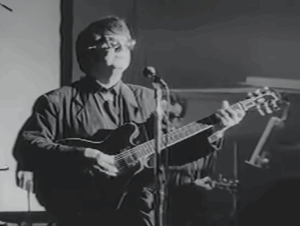7 Iconic Classic Rock Songs with Ridiculously Simple Guitar Riffs

via clubdoc / YouTube
Classic rock is filled with iconic guitar riffs that have stood the test of time. Some of these legendary songs are instantly recognizable not because of their complexity, but because of their simplicity. These riffs may be easy to play, but they left a lasting impact on rock music. Here are seven classic rock songs with surprisingly simple guitar riffs.
1. “Smoke on the Water” – Deep Purple
“Smoke on the Water” features one of the most famous and simple guitar riffs in rock history. The riff, played by guitarist Ritchie Blackmore, is just a series of power chords, yet it became a defining sound of the 70s. Despite its simplicity, the riff is instantly recognizable and widely imitated by beginner guitar players.
The song’s memorable riff made it a staple in rock music, showing that complexity isn’t always needed to create a classic. Its lasting appeal lies in its straightforward power, proving that sometimes, less really is more in rock.
2. “Sunshine of Your Love” – Cream
Cream’s “Sunshine of Your Love” is built around a simple, repetitive guitar riff that drives the entire song. Eric Clapton’s blues-inspired playing is laid-back but effective, and the riff remains one of the easiest for beginners to learn. The song’s straightforwardness doesn’t take away from its impact, as it became an enduring classic.
Even though the riff is uncomplicated, it helped shape the sound of late 60s rock and continues to be a favorite among musicians. The song’s simplicity allowed Clapton’s soloing to stand out, making it both an accessible and unforgettable rock anthem.
3. “I Wanna Be Your Dog” – The Stooges
The Stooges’ “I Wanna Be Your Dog” is a punk-leaning classic, known for its primal energy and a three-note guitar riff that repeats throughout the track. The riff, played by guitarist Ron Asheton, is basic, yet it captures the raw essence of the band’s sound. Its minimalist approach helped define proto-punk.
The song’s stripped-down riff makes it easy to play, but its simplicity is part of what gives it a rebellious edge. The Stooges proved that sometimes the most effective rock music doesn’t need to be technically impressive—it just needs attitude.
4. “Louie Louie” – The Kingsmen
“Louie Louie” by The Kingsmen has a riff so simple it can be played by almost anyone. The song’s basic three-chord progression became a blueprint for many garage rock bands, and its raw sound helped make it a hit. The riff’s simplicity allowed the song’s energy and chaotic feel to take center stage.
Though the recording quality was rough and the riff basic, “Louie Louie” became an anthem of youthful rebellion. Its influence on rock is undeniable, and the song’s simplicity made it a favorite for musicians starting out.
5. “Tush” – ZZ Top
ZZ Top’s “Tush” is driven by a straightforward blues-rock riff that packs a punch. Billy Gibbons’ clean and simple riff is easy to follow, yet it perfectly captures the band’s Southern rock style. The song’s no-frills approach allowed it to become a fan favorite without any complex guitar work.
“Tush” shows that ZZ Top’s strength lies in their ability to make even the simplest riffs sound cool and powerful. The track’s riff is a great example of how simplicity and groove can come together to create an unforgettable rock song.
6. “Wild Thing” – The Troggs
“Wild Thing” by The Troggs features a riff that is as basic as it gets—just a few repeated chords—but its raw energy made it an iconic song of the 60s. The simplicity of the riff makes it perfect for beginners, yet the song’s lasting appeal shows how effective a simple riff can be.
This song is proof that rock music doesn’t need to be complicated to make an impact. “Wild Thing” became a garage rock staple, and its riff, while easy to play, became a defining feature of the era’s rebellious spirit.
7. “Whole Lotta Love” – Led Zeppelin
Led Zeppelin’s “Whole Lotta Love” begins with a straightforward, driving guitar riff played by Jimmy Page. While Zeppelin is known for complex arrangements, the main riff in this song is relatively simple but packs a punch. Its powerful, repetitive nature makes it one of rock’s most recognizable riffs.
The simplicity of the riff allows the rest of the song to build around it, from Robert Plant’s vocals to John Bonham’s drumming. It’s a reminder that sometimes a basic riff can be the foundation of a rock classic.




















